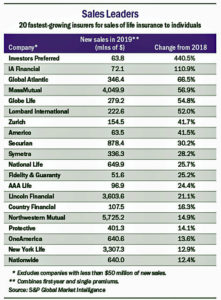National Life’s individual life sales growth earned us ranking among the 20 top life insurers by a trade publication.
Life Annuity Specialist used data from S&P Global Market Intelligence to come up with a ranking based on first year and single premiums.
Here’s what the report had to say.
The Secrets Behind the Life Insurers With the Fastest-Growing Sales
By Hannah Miller
Drumming up new life insurance sales isn’t always as hard as it seems.
Last year six larger companies expanded sales of life insurance to individuals by more than 50%, according to an analysis of S&P Global Market Intelligence data. To capture only new sales, we combined first-year and single premiums. Only companies with at least $50 million in sales for 2019 were included.
Some of the companies shared with us what helped drive their sales growth. Their responses ranged from specific products to industry trends, customer demographics and various strategies.

Investors Preferred, whose sales increased fourfold to $63.8 million, attributed its sales growth to its expertise in financial planning for high net worth individuals, according to CEO Alan Jahde. The carrier specializes in private placement policies.
Jahde said the company has seen its “average case size increase dramatically over the last few years.” Part of its success in catering to wealthy clients is because it can offer higher amounts of coverage than competitors because of its proprietary reinsurance programs.
Product Power
Other insurers on the list named specific products as helping sales of individual life.
MassMutual, which took fourth place with a 57% increase in sales to $4.05 billion, had its growth “powered” by its whole life insurance, according to spokeswoman Chelsea Haraty.
Securian Financial had 30% growth, according to the S&P data.
“2019 was our second full year of both SecureCare — our linked-benefit hybrid life/long-term-care insurance product — and new life insurance products for banks and credit unions being on the market,” said Ben Roth, VP of national sales.
Premiums were also higher for Securian’s variable life products, but not to the same degree, according to Roth. He added that industrywide factors also contributed to sales growth not just for Securian, but for other carriers as well.
“Across the industry, many products were discontinued at the end of 2019 due to the transition to new mortality tables for all life insurance carriers,” he said. “This accelerated year-end sales for nearly all carriers since products needed to be in-force by December 31.”
For OneAmerica, whole life products helped boost sales, but it was really its “asset-based” long-term care offering was the “real driver,” according to Dennis Martin, president of individual life and financial services. This type of policy can be funded with different assets such as a savings or retirement account, or home equity.
“It’s a unique product of OneAmerica, and that growth was both through expanded distribution reach, as well as growth in the product category in the industry in total,” he said.
A Winning Bet
Several insurers also benefited from growing interest in indexed universal life policies.
Global Atlantic,whose sales surged 67% to $346.4 million,focused specifically on this category, according to Dave Wilken, president of the company’s life insurance business. He said the company saw particularly strong sales of its Lifetime Builder Elite indexed universal life product.
John Phelps, an executive VP for F&G Life and Annuities, called the growth in indexed universal life “the success story of the industry.”
The company’s diverse offerings of the policies, including a range of indexes and benefits, helped drive its sales success, according to Phelps.

At National Life, where sales rose 26% last year, Senior VP Matthew Frazee said market conditions helped indexed universal life policies, such as the company’s flagship product FlexLife, deliver strong returns.
Last year, the Standard & Poor’s 500 Index, which is commonly linked to indexed products, leaped 29%.
Nationwide also benefited from a market shift toward indexed universal life insurance, according to Holly Snyder, president of Nationwide Life. She said the company saw a 26% increase in first-year premiums from this category.
Snyder named the company’s Indexed Universal Life Accumulator as the “most prominent product” contributing to the sales growth and added that it can also include a long-term care rider.
The shift away from standalone long-term-care products to combo products, where a life insurance policy offers a benefit for long-term care, continues to be an industry trend, she said.
Nationwide didn’t participate though in the “highly leveraged indexed designs that were the hottest selling products in the indexed universal product category during this timeframe,” she said.
Winning Strategy
Other companies named strategic moves or a business model that they say contributed to their success.
Lincoln Financial’s life insurance business saw “strong momentum” as the company expanded distribution and made product enhancements in fast-growing industry categories, according to spokesman Jay Russo.
“Specific areas that drove growth included indexed universal life insurance and term — two areas that Lincoln has made a concerted effort to grow over the past two years,” he said.
Aaron Ball, a senior vice president at New York Life, said the company’s business model, relying on its own agents to sell policies instead of outside independent advisors, was important for its sales growth of 13%.

